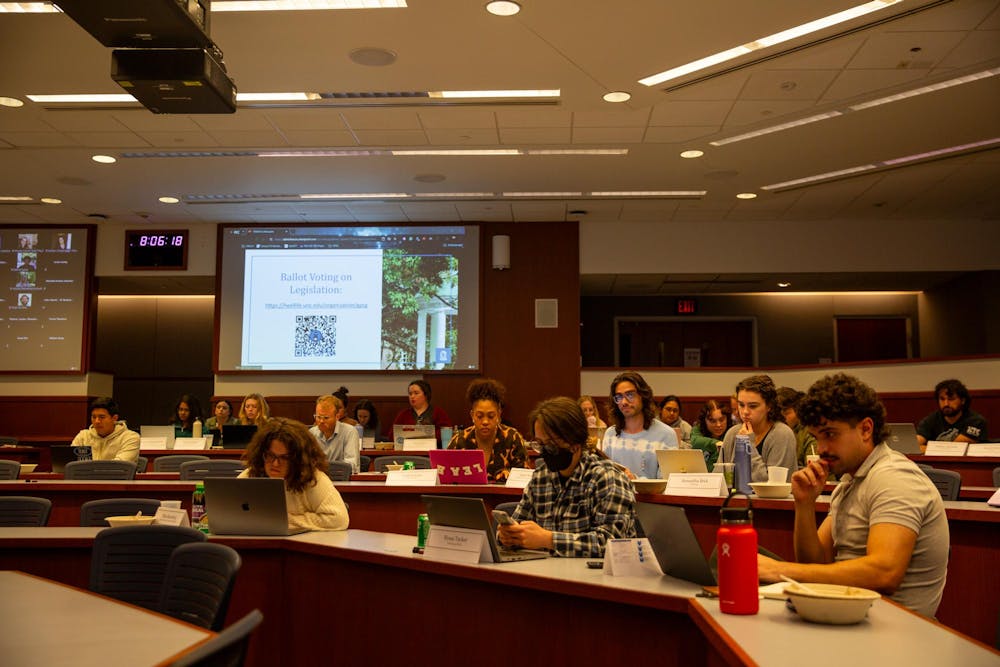Amireh said that after the meeting, a member of GPSG told him that University administration had “somehow got wind of the resolutions” and that they had been receiving emails from administration “pushing back” against them.
“While a vote of no confidence does not automatically result in their removal, the message remains clear: UNC graduate and professional students stand firm in their denunciation of the partisan takeover of UNC, the increased surveillance on campus and the repression and brutalization of student protestors being spearheaded by the Roberts-Clemens regime,” Senators Amireh and Tucker wrote in a press release shared with the The DTH.
In a statement to The Daily Tar Heel about the passed resolutions, Roberts said that he and Clemens are “guided by the best interests of our university, its mission and our faculty, students and staff.”
“Since I started in January, we’ve had the privilege of meeting with all kinds of people across our campus community to hear their concerns. I wish we had been given the same opportunity in this instance. The Provost and I will continue to work alongside all of our students and their representatives to serve our outstanding university,” Roberts said.
In a statement to The DTH, UNC Media Relations wrote that they have no further comment surrounding Clemens’ communication with GPSG senators at this time.
Undergraduate Senate & Joint Governance
According to Speaker of the Undergraduate Senate Matthew Tweden, there have been no conversations between the GPSG and Undergraduate senates as of Wednesday. Tweden said he has filed a motion to elevate the legislation to be reviewed by the Joint Governance Council as he perceives the resolutions to be “a potential implication to undergraduate student government's ability to execute its responsibilities through partnerships with the administration.”
“The risk with a resolution like this is that you're tying the hands of our lead negotiators, of our voices in the room, whether that's a sense of distrust between administration and the students working with them, an assumption of bad faith or simply not an invitation into certain conversations,” he said. “And I think in the last few years, we've seen the Undergraduate Senate pivot to take this a bit more seriously. And I think it's interesting that in the same time, the graduates have sort of regressed from that position.”
Tweden said that he doesn’t want to see the undergraduate senate’s work with administrators become “tied up” by the resolutions.
“I think it's very important that people understand just how much policy is individually made at the discretion of the chancellor and the provost, and our ability to work with them is incredibly important in representing student interests on campus,” he said .
According to Section 303 A of “The Joint Code of Student Government” any legislation that concerns both undergraduate and graduate and professional students is subject to review by the Joint Council.
Section 303 E of the Joint Code states that upon introduction of legislation in the Joint Council by the leader of the senate that produced it, any member of the council will be allowed to call for a vote on if the legislation is joint, applying to both undergraduate and graduate and professional students.
To get the day's news and headlines in your inbox each morning, sign up for our email newsletters.
“If a simple majority of present and voting members vote in the affirmative, then the legislation shall be treated as joint,” the code states.
As the no-confidence resolutions have been designated as Joint by the Undergraduate Senate Leadership, it will be subject to review by the Joint Governance Council in the next meeting on Wednesday, Oct. 16.
Prior to the meeting on Tuesday, President Katie Heath sent a memo to GPSG Senators expressing her concerns surrounding the resolutions stating that passing the legislation would put a “clear target on the back of all of Graduate and Professional Student governance.” She also said that the resolutions would impede progress being made on increasing stipends, GSPG funding, the Graduate Student Bill of Rights and more.
“Let me be clear, It is incredibly important that GPSG call out the actions taken by the administration over the past 6 months,” Heath wrote in the memo. “We should write resolutions that call out the erosion of shared governance and the decisions made by the administration that hurt graduate students, such as the sudden dissolution of the student-led honor court. These resolutions in their current version will not have that effect.”
CORRECTION: In a previous version of this article, Graduate and Professional Student Government Senator Nyssa Tucker was misidentified as Senator Nyssa. The Daily Tar Heel apologizes for this error.
@calebherrera_
@dailytarheel | university@dailytarheel.com



